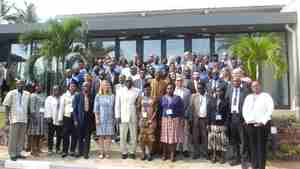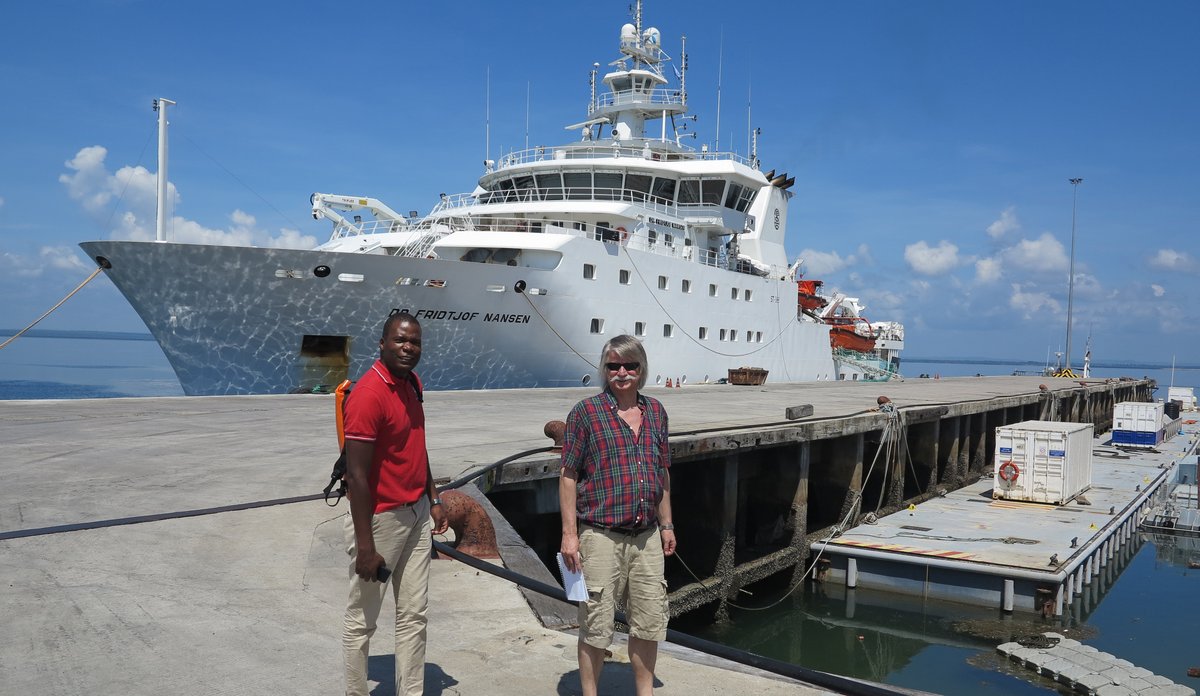The first Programme Forum in The EAF-Nansen Programme - a platform for partnership across Africa and the Indian Ocean for sustainable ocean use.

A new phase of the Nansen Programme began in 2017 with renewed and expanded objectives, building on a programme that has been welcomed by the developing world for more than 40 years. The scope of the new programme addresses known and emerging threats to ocean sustainability such as non-sustainable fisheries, climate change and pollution, and their compounded effects on the marine environment. A key principle of the programme is furthering stewardship of the developing world in addressing the above challenges through capacity development. Improved knowledge on fishery resources and ecosystems through the surveys with the RV Dr Fridtjof Nansen, as well as fostering good governance through the implementation of the ecosystem approach to fisheries, are important tools for achieving the programme goals of poverty reduction and improvement of food security.
The programme is considered an important vehicle on the pathway to achieve several sustainable development goals (SDGs), in particular SDG 14: Life under water. Other relevant goals include SDG 2: Zero Hunger and SDG 8: Decent work and Economic Growth.
It’s urgent
While there is an urgency to address sustainability issues on fisheries and ocean use, the challenges are daunting. Thus, the programme was built on the realization that close collaboration with partners and initiatives with similar objectives would be essential, in addition to fostering south-south collaboration. Currently, 31 countries from Africa and the Bay of Bengal have signed the programme agreement, making them official partners and the primary beneficiaries of the programme.
Partnerships are also continuously being developed through different types of agreements with a number of international, regional and national organizations as well as related initiatives with the aim of coordinating efforts to ensure optimal utilization of resources, avoid duplication and creating synergies to deliver results. The Programme is proud to work with regional fisheries bodies around Africa as well as with multi-sectoral organizations or initiatives, such as the Benguela Current Convention and the Canary Current Large Marine Ecosystem project, to strengthen the voice of fisheries in multi-sectoral settings. To further the achievements of Programme results, collaboration has also been established with various specialised institutions. One example is the joint work with the International Agency for Atomic Energy (IAEA) on ocean acidification. Other examples are collaborative work with science organizations such as the Western Indian Ocean Marine Science Association (WIOMSA) to work on diverse scientific studies in this region, and with the University of the Western Cape (South Africa). Through a dedicated project, the latter funds master and PhD students from Africa to conduct research and analyses on data collected by the RV Dr Fridtjof Nansen and that is also in line with the EAF-Nansen Science Plan.
The Programme is also a great facilitator of South-South collaboration and provides opportunities for exchange of expertise in areas of research and management. For example, exchanges take place across two highly productive marine systems in West Africa (the Canary Current and the Benguela Current) on various aspects of research and management. Other examples include cross-regional work on food security and nutrition.
The first Forum meeting
A major event in 2019 was the EAF-Nansen Programme Forum that took place from 5–6 November in Cotonou, Benin. The Forum saw the participation of around 70 scientists and fisheries managers representing 29 of the 31 partner countries, four partner regional organizations in Africa, and the implementing partners to the Programme: IMR, Norad, and FAO. The Norwegian Ministry of Foreign Affairs participated as an observer.

The Forum is one of the key consultative bodies of the Programme. The Forum provides a venue to assess progress made, deliver feedback on Programme implementation and allows sharing of experiences and lessons learned. This was the first Forum to be organized under the present phase, and the focus was on “Sustainability of Fisheries in the context of the Ecosystem Approach to Fisheries (EAF)”.
The ecosystem approach to fisheries (EAF), as described by FAO, entails a holistic and participatory approach to fisheries management that considers the interrelated ecological, socio-economic and governance aspects of a fishery to define where prioritized action is needed. The EAF-Nansen Programme works with partner countries to improve sustainability of fisheries through implementing this approach.
Sharing experiences
At the Forum two sessions were dedicated to EAF. One aimed at improving EAF implementation based on experiences, and the second presented sustainability issues of small pelagic fisheries in the main regions of the Programme.
During the first EAF session, six case studies were presented that showcased different experiences and lessons learned under different contexts. The case studies encompassed the management plan for the Tanzania artisanal fishery for small and medium pelagic fish species, the management plan for the line fishery in Mozambique, the management plan for shrimp resources in Gabon, the beach seine fishery in Cote d’Ivoire, the management plan for small pelagic fish in Morocco, and the management system in South Africa. Some of the aspects that were highlighted for success was the need for good communication with and the involvement of stakeholders at all levels, the need for a mandated group that monitors progress against agreed objectives, and the importance of adaptability of measures.

The second EAF session discussed key sustainability issues of small pelagic fisheries based on presentations of work by regional fisheries bodies, among other topics. Small pelagics (e.g. sardinella) are a key source of food and livelihood for coastal communities in Africa. Unfortunately, these resources and their associated livelihoods are being threatened by an increasing pressure on these resources, including from an increasing fishmeal industry, illegal, unreported and unregulated (IUU) fishing, leading in many cases to overfishing, and the environmental impacts of climate change. These issues were highlighted and discussed during the dedicated session.
Overall, the Forum served as an excellent mechanism for exchange between the partners of the Programme to share experiences and lesson learned. Furthermore, it provided an opportunity for the partners to provide feedback on how Programme implementation can be improved.
The EAF-Nansen Programme looks forward to 2020, and would like to thank all those involved in the Programme at IMR for their great efforts and achievements in 2019. For more information about Programme activities, please visit our home page at http://www.fao.org/in-action/eaf-nansen/en.
Contact
Merete Tandstad, EAF-Nansen Programme Coordinator merete.tandstad@fao.org
Gabriella Bianchi, EAF-Nansen Research Coordinator gabriella.bianchi@hi.no


